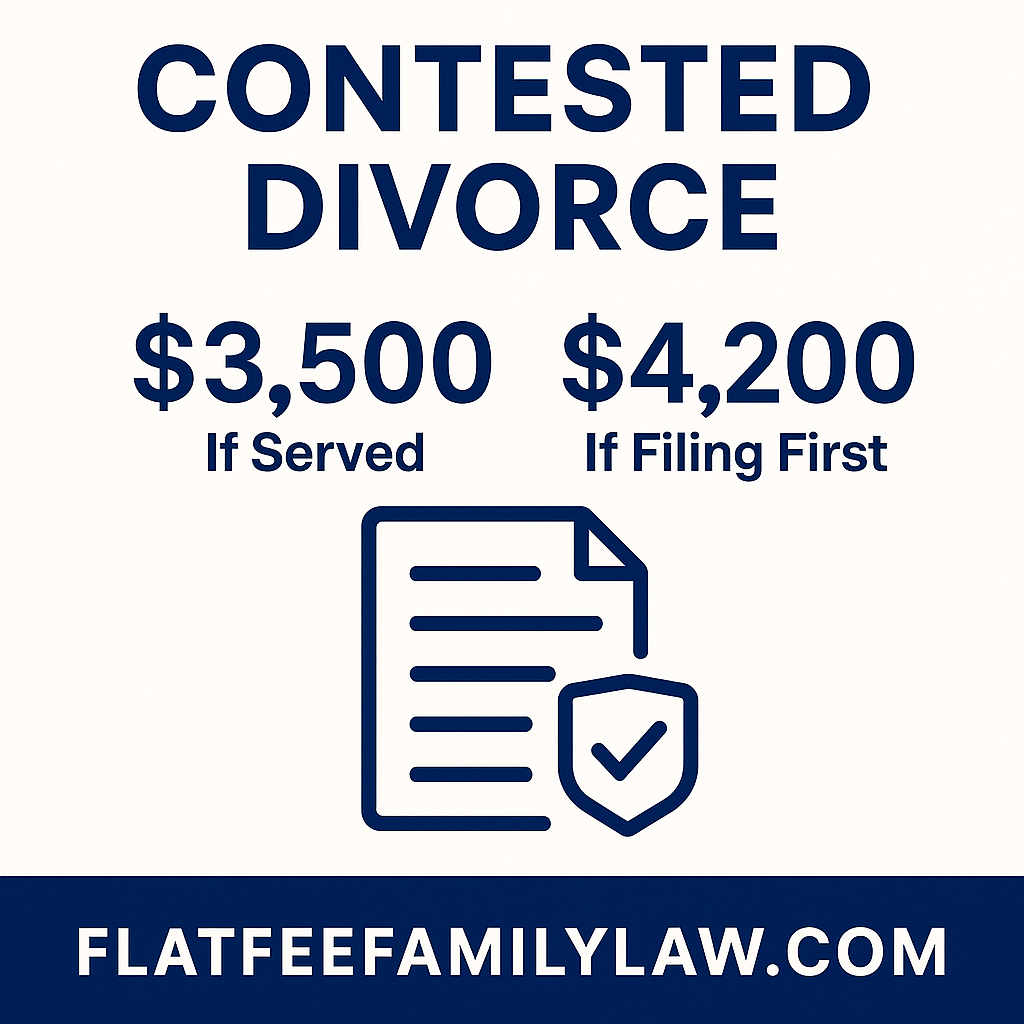Contested Divorce in Georgia: What Happens If We Can’t Agree?
Divorce is never easy, but when you and your spouse can’t agree on key issues, the process becomes more complex. In Georgia, this is called a contested divorce — when the parties disagree about custody, support, or property division.
Even when emotions are high, the right preparation — and the right attorney — can keep your case moving forward and protect your long-term interests.
Tip: If you and your spouse are able to agree on all major issues, you may qualify for an Uncontested Divorce in Georgia, which offers a faster, more affordable option.
What Makes a Divorce “Contested” in Georgia
A divorce becomes contested when the spouses cannot agree on one or more essential issues, such as:
- Child custody or visitation
- Child support or alimony
- Division of property or debts
- Who keeps the family home
- How retirement accounts or other assets are divided
By contrast, an uncontested divorce means both parties have already reached full agreement before filing — making the process quicker and less expensive.
Divorce cases in Georgia are filed in Superior Court, and follow the procedures outlined by the State of Georgia’s Divorce Filing Guidelines. To file, at least one spouse must have lived in Georgia for six months before the petition. The spouse filing first is the Petitioner, and the other is the Respondent.
The Contested Divorce Process in Georgia
While every case is unique, most contested divorces follow these general steps:
- Filing and Service of the Petition – One spouse files a Petition for Divorce and formally serves it on the other, starting the legal process.
- Response and Counterclaims – The respondent has 30 days to file an Answer — agreeing, denying, or filing counterclaims.
- Discovery and Evidence – Both sides exchange financial information, property details, and other documents such as bank statements or tax returns. Discovery may also include written questions (interrogatories) or depositions.
- Temporary Orders – Courts may issue temporary orders covering custody, visitation, or support while the case is pending.
- Mediation or Settlement Conferences – Many Georgia counties require mediation before trial — a step that often helps couples resolve disputes without court.
- Trial – If mediation fails, the case proceeds to trial before a judge — or sometimes a jury — who makes final decisions on custody, property, and support.
Timeline and Cost Considerations
A contested divorce in Georgia can take six months to two years, depending on how complex or contentious it becomes.
Common factors that extend the timeline include:
- Multiple hearings or pre-trial motions
- Disputes over custody or finances
- Scheduling delays for evaluations or discovery
Traditional hourly billing can make costs unpredictable — especially when a case stretches over many months. That’s why FlatFeeFamilyLaw.com offers full-case representation at one clear flat rate:
| Situation | Flat Fee* | What’s Included |
|---|---|---|
| You are filing for divorce (initiating the Petition) | $4,200 | Full representation through fair settlement or trial, including all paperwork and filings required to initiate your case, communication with opposing counsel, review of pleadings, negotiation, and all court appearances. |
| You have been served with a Petition for Divorce (responding) | $3,500 | Full representation through fair settlement or trial, including communication with opposing counsel, review of pleadings, negotiation, and all court appearances. |
*Certain expenses required or ordered separately by the court — such as mediator fees, guardian ad litem fees, psychological evaluations, or other third-party professional costs — are not included in the flat fee and must be paid directly by the client to the provider involved.
There are no retainers, no hourly billing, and no surprise invoices — just one predictable flat fee.
How Flat-Fee Representation Protects You
Our flat-fee structure provides complete legal representation through every stage — from filing through settlement or trial.
This approach helps clients:
- Stay focused on the facts instead of hourly costs
- Budget confidently with no surprise billing
- Receive consistent, strategic representation start to finish
At Flat Fee Family Law.com, we believe predictability reduces stress. Whether your case resolves in mediation or goes to trial, your fee stays the same.
What To Do If You Expect a Contested Divorce
- Act early. Consult an attorney before signing or responding to anything.
- Stay organized. Gather financial records, property documents, and parenting schedules.
- Be realistic. Focus on long-term stability for your family, not short-term victories.
- Follow court orders. Small mistakes can have big consequences later.
Tip: If your case involves questions of custody or parental rights outside of a marriage, visit our Legitimation in Georgia page for guidance on protecting parental rights.
The Bottom Line
A contested divorce can feel overwhelming, but the right strategy and representation make all the difference.
Our experienced Georgia divorce lawyer provides professional, transparent, flat-fee representation — so you can focus on your future instead of your legal bills.
📞 Call 404-963-1229 or Book a Consultation Online to discuss your contested divorce today.
Learn more about our Full-Case Divorce Representation Services.
FAQs
How long does a contested divorce take in Georgia?
Most contested divorces take six months to two years, depending on how quickly disputes are resolved and whether mediation avoids trial.
Do I have to go to court for a contested divorce?
Often yes, but many cases are resolved in mediation or by settlement before reaching trial. Your attorney can represent you at all required hearings.
What costs should I expect?
FlatFeeFamilyLaw.com offers full-case representation for ,500 if you’ve been served or ,200 if you are filing, with no retainers or hourly billing. Court-ordered third-party expenses such as mediation fees or guardian ad litem costs are the responsibility of the client and paid separately.
How can I make a contested divorce go faster?
Stay organized, respond promptly to your attorney, and keep communication factual. Delays usually happen when information or documents are missing.







